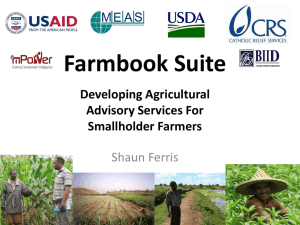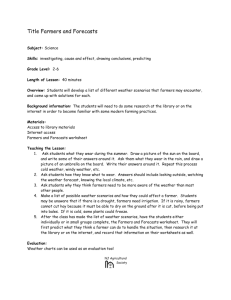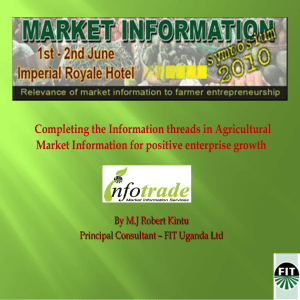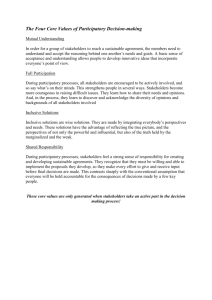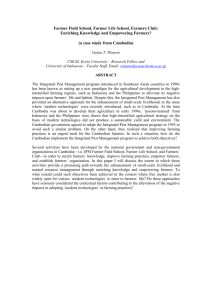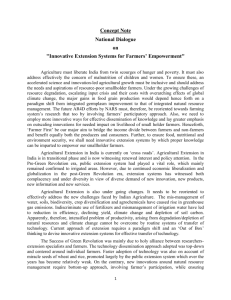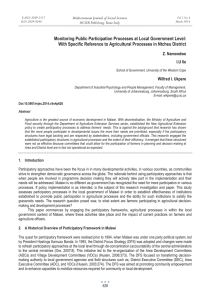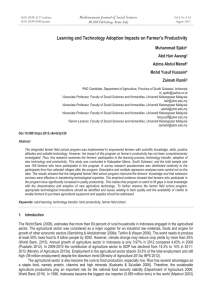Participatory Agricultural Research
advertisement
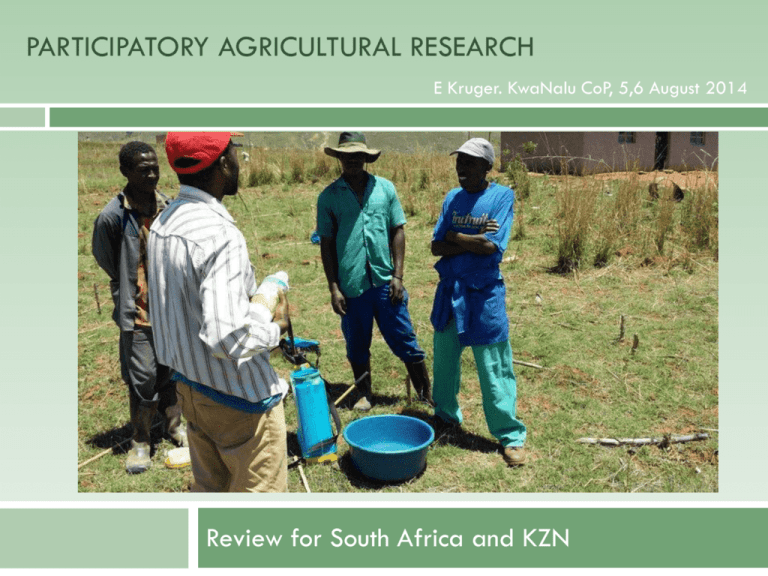
PARTICIPATORY AGRICULTURAL RESEARCH E Kruger. KwaNalu CoP, 5,6 August 2014 PARTICIPATORY AGRICULTURAL RESEARCH Review for South Africa and KZN International trends Recognition of the importance of reduction of rural poverty, food insecurity and malnutrition Through giving attention to agricultural innovation systems that lead to outcomes at scale – Smallholder family farmers become central in the design of research processes as partners in planning and implementation This requires multi-dimensional and multi stakeholder learning processes From----To From increase in production to improvement in local livelihoods From technology transfer to codevelopment of innovation systems From beneficiaries of projects to influential stakeholders within programmes From functional participation to empowerment From applied and adaptive research to strategic and pre-adaptive research Themes Increasing productivity and sustainability; mostly in the developing South and mostly with support from more developed Northern countries Pro poor targeting Conservation and sustainable use of natural resources Local governance and equity (especially gender) Trade globalisation and supply chains Migration and rural-urban dynamics Property rights and collective action Agriculture and human health Multi stakeholder partnerships Underlying assumptions/goals x x New technology is the key leading factor in the process of desired social change Increased yields and production is the underlying goal of all agricultural research and development Meaningful participation of user groups in the process of investigating improvement in local situations Increased livelihood diversity, resilience and security is to be the underlying goal of all agricultural research and development In SA Two broad trends Participatory innovation development Primarily NGOs supported through international donor or more recently, CSI funding. Including organisations with an advisory/extension role Participatory More action research the domain of Universities; Easier to tailor around post graduate degrees Participatory Action Research Emphasises participation and action, through research Seeks to understand the world by trying to change it, collaboratively and following reflection Collective inquiry and experimentation grounded in experience and social history. Provides academic flexibility and rigour and a framework to include socio-political and cultural aspects Primarily a method of social enquiry Methodologies: PRA and PLA , experiential learning and indigenous knowledge facilitation techniques, photo voice, community theatre, role plays Participatory Innovation Development Learning and innovation in sustainable agriculture programmes Involves collaboration between researchers and farmers in analysis and testing of alternatives Response to locally defined problems by involving farmers as users of the research process; lately expanded beyond technologies to socioorganisational arrangements Methodologies; farming systems research and extension, PTD, Farmer to Farmer , Farmer Field Schools, Lessons from Agricultural Extension A Technology Transfer System Researcher Extension Officer (linear) Farmer Farmer Researcher An Action Research / Learning System (facilitation) Extension Officer Example 1: GrainSA SFIP Farmer centred innovation systems research process working with farming learning groups and local facilitators to implement a farmer experimentation process Focused on conservation agriculture -situated within the whole maize value chain and organised around Saving and Credit groups as the organising principle. Example 2: University of MissouriKwaNalu Community of Practice The Community of Practice (CoP) approach includes smallholders, their communities, scientists, and agribusiness and government representatives and allows emerging farmers to be at the centre they will experiment and use GM crops in their own fields. Such participatory research creates feedback loops for researchers, farmers, extension advisors, policymakers and others involved SA Policy Catch all Technology transfer: diffusion of technology still seen as relevant, with training of extension officers and on farm training of farmers Participatory approach; builds on farmers’ own capacities and abilities to organise themselves, with on farm trials and dissemination of innovations Advisory approach; achievable in the highly commercial farming sector where farmer are highly competent, able to identify their own problems and are innovators. (DoA 2005 Strategy) This highlights the difficulties Government is facing in providing a systematic and coherent service to farmers and an inability to integrate the concepts of placing farmers centre stage in any of the agricultural research and development processes
